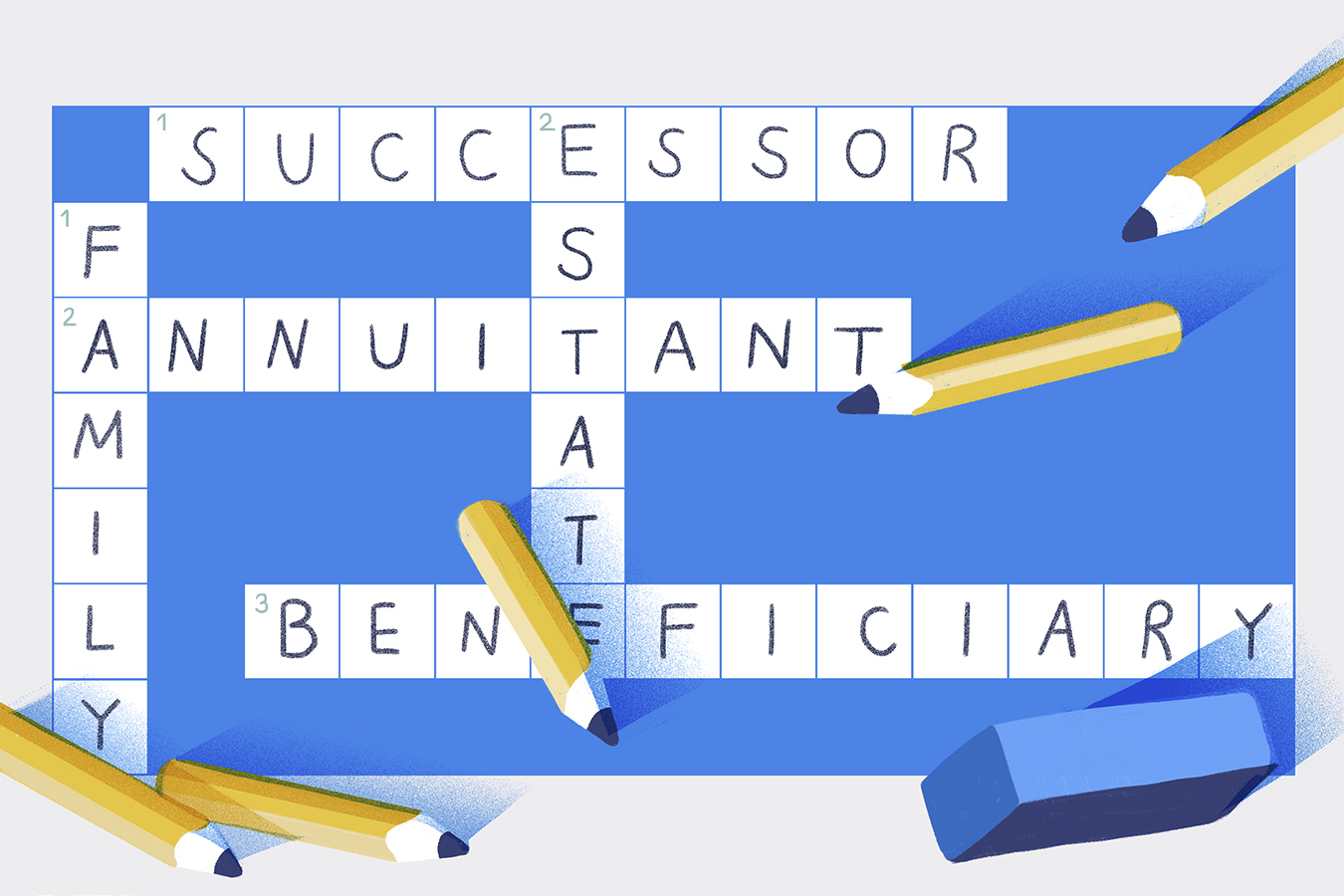Naming a Beneficiary: Choices for Your Account Type
Published on May 2, 2019
minute read
Share:
Each type of investment account has rules for naming beneficiaries (or other designations). To help you understand your choices, let's break it down by account type. Note for Quebec residents: You cannot name a beneficiary, successor holder or annuitant on a registered account. The proceeds of your plan will be part of your estate. If you wish to designate a person to receive them, you must do so in a will under Quebec legislation.

RRSP Account Holders
You can name anyone you wish as a beneficiary (or beneficiaries) of your Registered Retirement Savings Plan (RRSP). However, to benefit from the deferral of taxes upon your death, the named beneficiary of your RRSP must be:
- Your spouse or common-law partner;
- A financially dependent child or grandchild under 18 years of age; or
- A financially dependent mentally or physically infirm child or grandchild of any age
RRIF Account Holders
As with RRSPs, you can name anyone you wish as beneficiary (or beneficiaries) of your Registered Retirement Income Fund (RRIF). To benefit from the deferral of taxes, the qualifications are the same as with RRSPs above. However, with RRIFs, you also have the option of naming your spouse as a "successor annuitant" rather than beneficiary. (For RRSPs, you can't name a successor annuitant. Naming one or more beneficiaries is your only option.)
What is a successor annuitant?
With RRIFs, you can choose to name a "beneficiary" or "successor annuitant" to inherit your RRIF assets. A successor annuitant can only be a spouse or common-law partner and the designation enables them to take on ownership of your RRIF without the need to transfer funds out of the account.
Upon your death, your successor annuitant assumes ownership of your RRIF account, with no tax consequences to your estate. Your spouse or common-law partner would simply replace you as the holder of your RRIF, or they could transfer your RRIF investments into their own RRIF account and continue to receive your RRIF payments. If the RRIF investments are rolled into the successor annuitant's RRSP instead of a RRIF, their RRSP contribution room would be unaffected.
What if I name a beneficiary rather than a successor annuitant?
When a surviving spouse or common-law partner is named as a beneficiary instead of a successor annuitant, the RRIF account is treated differently. It is closed after the assets are transferred to the beneficiary, though tax deferral options can still be available.
TFSA account holders
When you leave TFSA assets to your spouse or partner, you can choose to designate them as a "successor holder" instead of a beneficiary.
What is a successor holder?
A "successor holder" is who you name to inherit your TFSA assets, and can only be your spouse or common-law partner.
Upon your death, your successor holder assumes ownership of your TFSA account and isn't required to transfer funds out of the account. They would simply replace you as the holder of your TFSA, and their own TFSA contribution room would be unaffected. Naming a successor holder also effectively ensures that income earned in your TFSA account after your death is not taxed.
If you have a spouse or common-law partner, you might choose to name him or her as a successor holder, rather than as a beneficiary. In this way, income earned in your TFSA after death is not taxed.
What if I name a beneficiary rather than a successor holder?
If someone other than a spouse is named to inherit the assets in your TFSA, this person is considered your "beneficiary" and is entitled to receive the assets up to the date of your death tax-free. Income earned in your TFSA after death is taxable. After the assets are transferred, your TFSA account is closed.
If your spouse is the beneficiary of your TFSA, he or she can make an "exempt contribution" to their own TFSA, provided certain requirements are met. In the absence of naming a successor holder, income earned in a TFSA after death is taxable.
Some Key Information
- You cannot name a beneficiary or successor holder/annuitant on non-registered accounts.
- You can have more than one beneficiary, and this information can be updated on your account at any time.
- A successor annuitant (RRIF) or successor holder (TFSA) can only be your spouse or common-law partner.
- British Columbia residents have the option to name irrevocable beneficiaries. Changes can only be made with the beneficiary's consent.
Registered Account Cheat Sheet
| If you have a: | You can name: |
| RRSP | One or more beneficiaries |
| RRIF | One successor annuitant or one or more beneficiaries |
| TFSA | One successor holder or one or more beneficiaries |
| RESP |
One beneficiary for an individual RESP Multiple beneficiaries for a family RESP Note: Unlike other registered accounts, an RESP's funds are not necessarily distributed when you pass away. If there is a joint or successor subscriber to the RESP, the RESP can remain open until amounts are paid to the account's beneficiary when he or she attends a qualified post-secondary education program. If there is no successor subscriber, sometimes the RESP needs to be closed and the assets distributed. For more information, read Understanding RESPs and RESPs: FAQs. |
Locked-in Plans: There may be restrictions on designating a beneficiary for a Locked- in Retirement Account (LIRA), Life Income Fund (LIF) and Locked-in Retirement Income Fund (LRIF) accounts. Most jurisdictions legislate that such funds be provided to your spouse/common-law partner, should you have one. Check with a tax advisor or estate planner in your province of residence about these types of plans.
Ready to get started? Access our View & Designate Beneficiaries page or access our forms directly.
The information provided in this article is for general purposes only and does not constitute personal financial or tax advice. Please consult with your own professional advisor to discuss your specific financial and tax needs.
RBC Direct Investing Inc. and Royal Bank of Canada are separate corporate entities which are affiliated. RBC Direct Investing Inc. is a wholly owned subsidiary of Royal Bank of Canada and is a Member of the Investment Industry Regulatory Organization of Canada and the Canadian Investor Protection Fund. Royal Bank of Canada and certain of its issuers are related to RBC Direct Investing Inc. RBC Direct Investing Inc. does not provide investment advice or recommendations regarding the purchase or sale of any securities. Investors are responsible for their own investment decisions. RBC Direct Investing is a business name used by RBC Direct Investing Inc. ® / ™ Trademark(s) of Royal Bank of Canada. RBC and Royal Bank are registered trademarks of Royal Bank of Canada. Used under licence. © Royal Bank of Canada 2019. All rights reserved.
The views and opinions expressed in this publication are for your general interest and do not necessarily reflect the views and opinions of RBC Direct Investing. Furthermore, the products, services and securities referred to in this publication are only available in Canada and other jurisdictions where they may be legally offered for sale. If you are not currently resident of Canada, you should not access the information available on the RBC Direct Investing website.
Inspired Investor brings you personal stories, timely information and expert insights to empower your investment decisions. Visit About Us to find out more.










